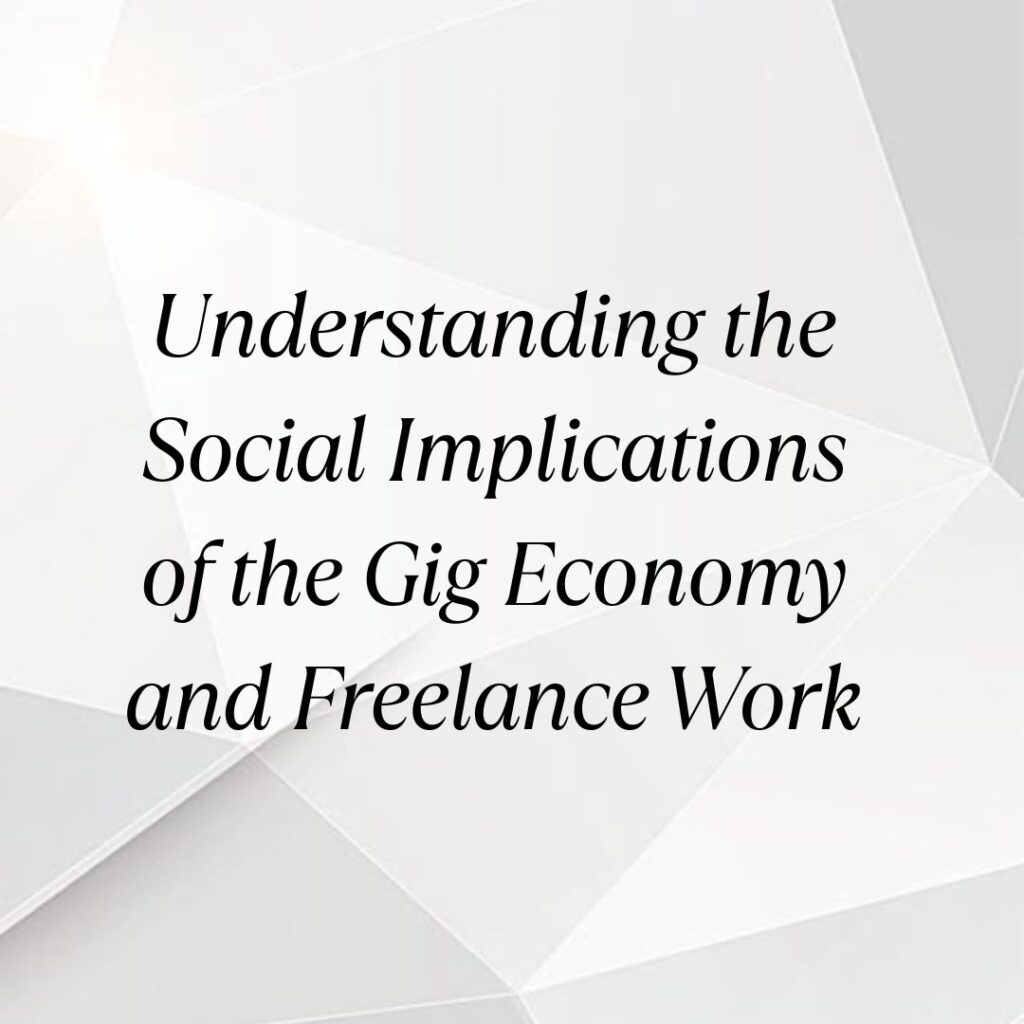In today’s rapidly evolving economic landscape, traditional notions of work are being reshaped by the rise of the gig economy and freelance work. What exactly does this mean for society at large? Let’s dive deep into the social implications of these transformative trends and explore how they are shaping our world.
What is the Gig Economy?
The gig economy refers to a labor market characterized by short-term contracts or freelance work as opposed to permanent jobs. It’s fueled by digital platforms that connect independent workers with clients seeking specific services, ranging from ride-sharing and food delivery to graphic design and consulting.
The Rise of Freelance Work
Freelancing, on the other hand, encompasses a broader spectrum of independent work where individuals offer their skills and expertise on a project basis. This includes writers, photographers, software developers, and many other professions traditionally associated with self-employment.
Social Implications
1. Flexibility vs. Stability
One of the most significant impacts of the gig economy is the trade-off between flexibility and stability. While gig workers enjoy the freedom to choose when and where they work, they often lack the job security and benefits (such as health insurance and retirement plans) provided by traditional full-time employment. This has profound implications for individuals and families, leading to financial uncertainty and challenges in long-term planning.
Example: Sarah, a graphic designer, enjoys the flexibility of freelancing but worries about saving for retirement without employer-sponsored plans.
2. Work-Life Integration
Freelancers often blur the lines between work and personal life, as their work schedules can be erratic and unpredictable. This can lead to challenges in maintaining a healthy work-life balance, impacting mental health and overall well-being.
Example: John, a freelance writer, struggles to disconnect from work during evenings and weekends, affecting his family time and stress levels.
3. Economic Inequality
While some gig workers thrive in the new economy, others face precarious working conditions and low wages. This exacerbates existing economic inequalities, as access to well-paying gigs and opportunities for career advancement varies widely.
Example: In urban areas, ride-sharing drivers may struggle to earn a living wage after factoring in expenses like vehicle maintenance and fuel costs.
4. Skill Development and Upskilling
Freelancers often need to continuously upgrade their skills to remain competitive in the marketplace. This ongoing need for upskilling presents opportunities for personal growth but also requires dedication and investment in learning new technologies and trends.
Example: Maria, a freelance web developer, regularly takes online courses to stay abreast of advancements in programming languages and web design.
5. Impact on Traditional Industries
The gig economy has disrupted traditional industries, prompting businesses to rethink their hiring practices and operational models. Some sectors have embraced freelancers to reduce overhead costs and increase agility, while others face challenges in adapting to the gig economy’s fluid workforce.
Example: Traditional taxi companies have had to compete with app-based ride-sharing services, leading to regulatory debates and shifts in consumer behavior.
6. Social Safety Nets
The rise of gig work has highlighted gaps in social safety nets designed for traditional employees. Issues such as access to healthcare, unemployment benefits, and worker protections are critical areas where policy reforms are needed to support gig workers and ensure their well-being.
Example: Freelancers advocating for portable benefits that can travel with them across different gigs to ensure basic protections.
Relevance to Current Times
In the wake of the COVID-19 pandemic, the gig economy gained further prominence as remote work and digital platforms became essential for economic survival. The crisis underscored both the resilience and vulnerabilities of gig workers, highlighting the urgent need for policies that address their unique challenges.
Conclusion
The gig economy and freelance work are reshaping how we work, live, and interact with each other. While offering unprecedented flexibility and opportunities for innovation, they also pose significant social challenges that require thoughtful consideration and proactive solutions. As we navigate this evolving landscape, it’s crucial to prioritize fairness, inclusivity, and sustainable practices to build a future where work benefits all members of society.
In essence, understanding the social implications of the gig economy and freelance work is not just about economics; it’s about envisioning a more equitable and resilient future for everyone involved.







